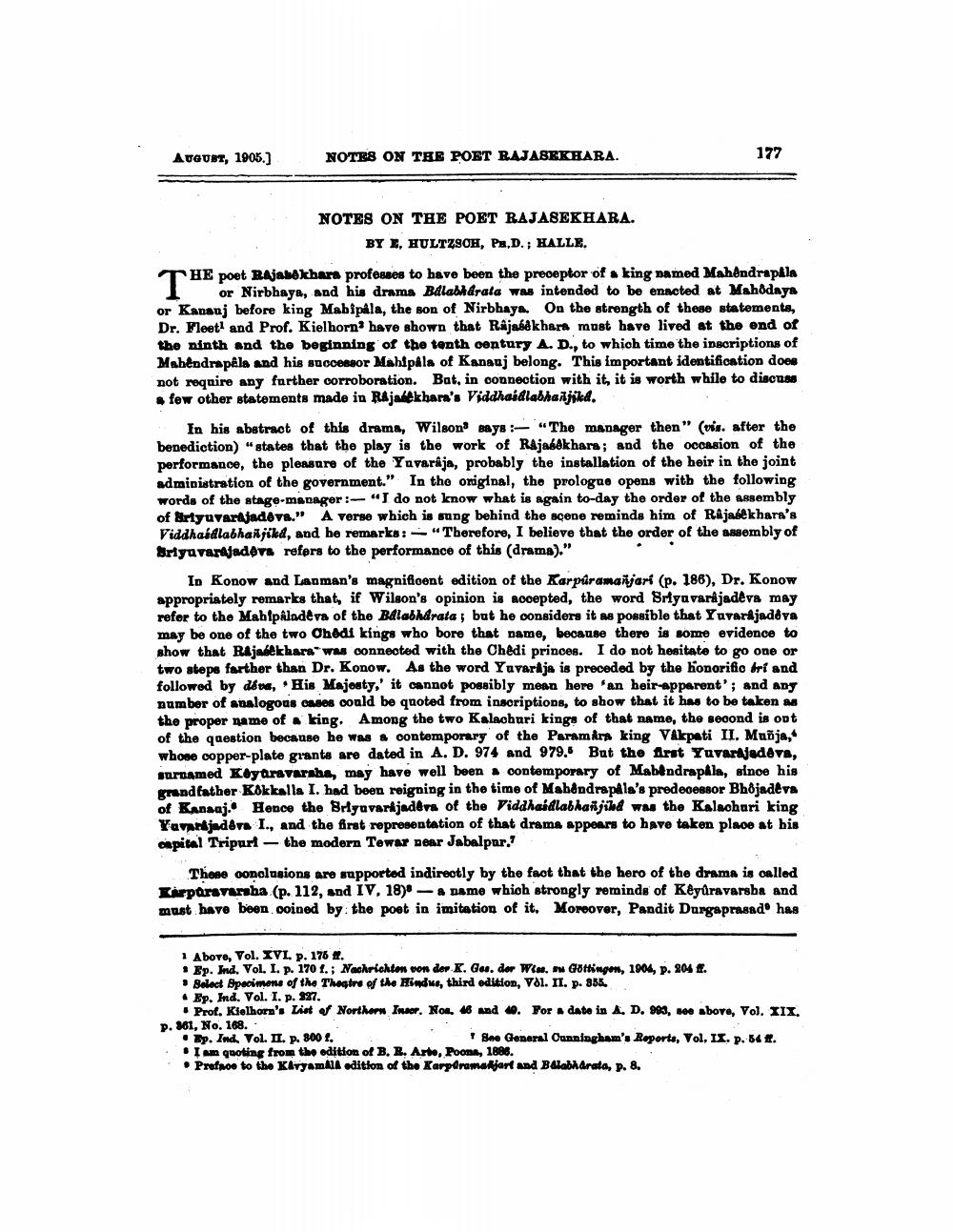________________
AUGURT, 1905.)
NOTES ON THE POBT RAJASEKHARA.
177
NOTES ON THE POET RAJASEKHARA.
BY E, HULTZ9OH, PE.D.; HALLE.
THE poet Rajabokhara professes to have been the preceptor of a king named Mahendrapala
1 or Nirbhaya, and his drama Balabhdrata was intended to be enacted at Mahôdaya or Kananj before king Mahipala, the son of Nirbhaya. On the strength of these statemente, Dr. Fleet and Prof. Kielhorn' have shown that Rajasekhara must have lived at the end of the ninth and the beginning of the tenth century A. D., to which time the inscriptions of Mahendra pêla and his successor Mahipals of Kanaaj belong. This important identification does not require any further corroboration. Bat, in connection with it, it is worth while to discuss
few other statements made in Rajatékhara's Viddhaidlabhanjika.
In his abstract of this drama, Wilson' says :- "The manager then" (vis. after the benediction) "states that the play is the work of Rajasekhara; and the occasion of the performance, the pleasure of the Yavaraja, probably the installation of the heir in the joint administration of the government." In the original, the prologao opens with the following words of the stage-manager :- "I do not know what is again to-day the order of the assembly of Betyuvardjadeva.” A verse which is sung behind the scene reminds him of Rajabłkhara's Viddhaidlabhai jild, and he remarks: -“Therefore, I believe that the order of the assembly of Bryavarajadors refers to the performance of this (drama)."
In Konow and Lanman's magnificent edition of the Karpüramanjari (p. 186), Dr. Konow appropriately remarks that, if Wilson's opinion is accepted, the word Bryavarajadeva may refer to the Mahipaladeva of the Balabhdrata ; but he considers it as possible that Yuvarljadeva may be one of the two Ohodi kings who bore that name, because there is some evidence to show that Rajabékhara wus connected with the Chedi princes. I do not hesitate to go one or two steps farther than Dr. Konow. As the word Yavarija is preceded by the honorifio brí and followed by dena, His Majesty,' it cannot possibly mean here 'an beir apparent'; and any number of analogous cases could be quoted from inscriptions, to show that it has to be taken as the proper name of a king. Among the two Kalachari kings of that name, the second is opt of the question because he was contemporary of the Paramarn king VAk pati II. Muñja, whose copper-plate grants are dated in A. D. 974 and 979. But the frut Yavardjedera, Jurtamed Keyarsvarabe, may have well been contemporary of Mabindrapkla, sinoe his grandfather Kákkalla I. had been reigning in the time of Mahendrapala's predecessor Bhöjadeva of Bensaj. Hence the Briyavarijaders of the Viddhaidlabhatijild was the Kalachuri king Yaranjadên I., and the first representation of that drama appears to have taken place at bis capital Tripurt - the modern Tewar near Jabalpur,
Thone conclusions are supported indireotly by the fact that the hero of the drama is oalled Karparavarsha (p. 112, and IV. 18) - name whioh strongly reminds of K@yuravarsba and must have been coined by the poet in imitation of it. Moreover, Pandit Durgaprasado has
1 Above, Vol. IVL p. 176.
Bp. Ind. Vol. I. p. 170 1. ; Nachrichten von der K. Gus. der Win Göttingen, 1904, p. 204 f. • Select Specimens of the Theatre of the Hindus, third edition, Vol. II. p. 85% . Bp. Ind. Vol. I. p. 127.
• Prof. Kielhorn's List of Northern Incor. No. 46 and 4. Por date in A, D, 900, 1ee above, Vol. XIX. p. 361, No. 168. • Bp. Ind. Vol. II. p. 800 .
Bne General Cunningham'. Reports, Vol. IX. p. 54. • Ium quoting from the edition of B. B. Arte, Pooms, 1898.
Prefpoe to the KavyamAll edition of the Karperamaiart and Balabharata, p. 8.




